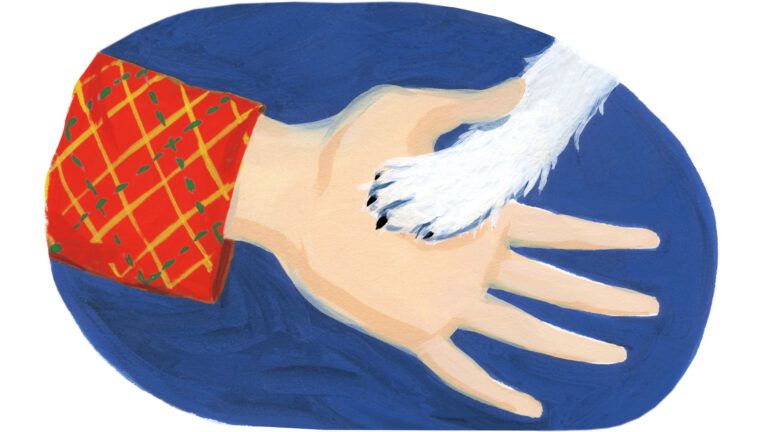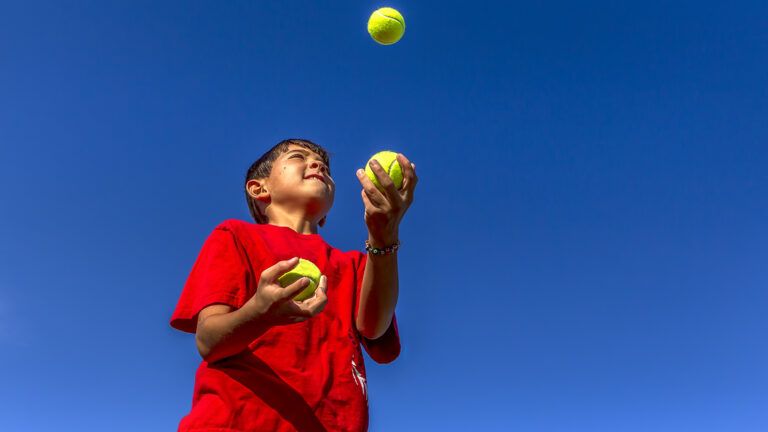Prayer. I’d always believed in it. I believed that God cared about every aspect of my life, big or small. I talked to him about everything. When I was young I wrote to him in a journal: “Please, help me get an A on my German test,” or “Please help me learn how to roller skate.” I knew that God was watching over me.
Not that all my prayers were small. Some were so big that I didn’t even think they had to be stated. Would I get married someday? Of course. Would I have a brilliant career as a doctor or a lawyer? No question. And yes, I would have lots of children. From the time I cradled my first Madame Alexander doll to the years in my teens when I was the busiest babysitter in Richmond, Virginia, I was always preparing for motherhood. God knew how much I wanted to be a mother.
Even before I prayed for the perfect husband, God sent someone my way. “Are you Scot McRoberts?” I asked the shy, blond-haired boy in my 10th-grade German class. “My brother knows your brother,” I told him. From that moment we started spending time together—studying, eating lunch, playing tennis. We had Double-R-Bar Burgers at Roy Rogers and went to the movies after school. We even went together to the junior and senior proms. Scot stayed in Virginia for college while I went off to Duke University in North Carolina. During that time we kept close ties but led separate lives. I can’t say that I always knew that I would marry Scot or that I even wished for it, but we developed a close and enduring friendship that held the potential for more.
As we approached our mid-20s, old enough for marriage to be more than a dream or a prayer, we talked of our growing love. I remember once sitting with Scot at his church, Trinity United Methodist, and saying to God, “I can’t possibly get married in this church unless they get rid of that green carpet.” When the carpet was replaced with a majestic red, it was as if our fate were sealed.
One warm fall day in 1986 the two of us were packing for one of our favorite canoe trips from Westview to Maidens on the James River. Scot took out a small box and thrust it toward me. “Look what I’ve got!” he said. Inside was an exquisite diamond ring that had belonged to his grandmother. Later that afternoon as we were lazily paddling down the river, lost in the magic of our still-unspoken decision, we began to talk about how many children we would have—maybe four, maybe six. We even tried out some names.
We married in the summer of 1987. Scot worked for the Boy Scouts of America while I finished law school and started working at a large Richmond law firm. We bought our first house. Scot traveled in his job and I worked long hours, but we became active at church. We attended an adult Sunday school class, helped lead the youth group, played softball, and served on various committees. That first baby? No problem. It would happen when the time was right.
Three years went by without a pregnancy, but we were not troubled. Then, one night in 1990, I glanced at an article in my Duke alumni magazine on in vitro fertilization. One sentence popped out at me: “Infertility is the failure to conceive after one year.”
“Do you think we might be infertile?” I asked Scot. I showed him the article.
“I’m sure we’re fine,” he said. I was sure he was right. God would give us a child when we were ready. I didn’t question it.
Yet month after month, year after year, I failed to conceive. I talked with my doctor about it. In 1992, Scot and I finally began the standard tests for determining the cause of infertility. “You have blocked fallopian tubes,” the doctor explained. “There are two options. We can try to unblock your tubes surgically or go right to in vitro fertilization.”
It’s just a medical problem, I told myself, with a medical solution. We now knew what to do next. In fact, within a few months after the surgery, I got pregnant. The sight of that tiny speck on the ultrasound screen was pure joy. Scot and I talked about which bedroom would be the baby’s room and how to start saving for college.
A month later, Scot was at a meeting and I was at a college alumni dinner when I began to bleed. I excused myself and called my doctor, then Scot. “I lost the baby,” I told Scot. “I’m sorry. . . . ” I didn’t know why I was apologizing. I didn’t know why I felt like I’d done something wrong. Hadn’t we done everything right? Hadn’t we prayed? What more could we do?
We decided to give in vitro fertilization a try. The first step was to give myself injections to control my ovulatory cycle. Then, Scot gave me hormone injections to stimulate my ovaries production of eggs. Later the eggs were harvested, fertilized in the lab and placed in my uterus. All I needed was for one of them to take and I would have my miracle.
Not only did I become pregnant, but the ultrasound showed twins. My hopes mounted with each day. One month, two months. My fears of another miscarriage subsided. Perhaps all of this is for a purpose, I reasoned. God meant us to be the parents of twins.
I miscarried again. This time I faced more than the heartache of the loss itself; I faced the reality that my infertility was not simply a medical problem. Now I began to view the situation in a spiritual light. God knew how much I wanted children, but just in case he needed to be reminded, I would pray harder.
Around this time I became involved in starting a new adult Sunday school class at church—one geared toward younger members, many of them newly married and ready to begin their families. As a teacher, I had to learn more fully from Scripture what it means to rely on God and how to do it. In the class we would explore topics such as “Does God hear and answer prayers?”
One of the challenges for me was how I could be a good example. As I prepared for class, the thought came to me, Ask them to pray for you. In spite of my faith and beliefs, I realized then that I had never asked others to pray with me or for me. That morning I cautiously told my class of my heartache and our struggle. “Scot and I have been praying for some time to have a baby. Please pray for us.” And they did pray—for the in vitro fertilization we tried four more times—with no success. Each time we went back to the class and told them what had happened, asking again for more prayers.
One evening as Scot and I lay in bed pondering our future and planning for the next phase, he said, “You know, we don’t have to have children.” I looked at him and realized that he was growing weary of the ups and downs too. He was tired of seeing me in pain. That night, long after he fell asleep, I closed my eyes. I thought about prayer, how it had flowed through all my life like a current, providing blessings both expected and unexpected. Yet what was this relationship I had with God? Had I truly come to trust him with my life?
Now, instead of asking God for anything, my prayer consisted of opening myself. I had never sought God’s will for my life. Maybe I hadn’t really wanted to know. I think I’m ready now, God. Please show me your way, whatever it is. Give me strength to accept your will. It was the hardest prayer I have ever made, offering everything to God but demanding nothing. I prayed to accept God’s will for my life rather than to have my desires fulfilled. And within my prayer there was victory and surrender all in one.
In 1999 Scot and I adopted our first son, Sam, now almost four, and in 2001, we adopted our second son, Max, now almost two. I have not had a second of doubt that these children are the ones that God intended for us. Along the way, I have learned that God’s ways are not necessarily my ways. In learning to pray for God’s will, I have been transformed. And of all the answers to prayer that he has given me, the gift of acceptance has been the greatest.





